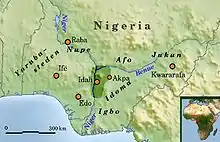Igala people
The Igala are one of the ethnic groups found in Nigeria. The Igala are the 7th largest ethnic group in Nigeria and played significant roles in the formation of Nigeria having been made host to the capital of Nigeria at Lokoja in the past, with Lugard as the Governor. The Igala Kingdom expanded beyond the present day boundary. The kingdom welded power up to lower Kaduna River, down to Onitsha and other parts of the Eastern Nigeria. Their homeland, the former Igala Kingdom, is an approximately triangular area of about 14,000 km2 (5,400 sq mi) in the angle formed by the Benue and Niger rivers.[2] The area was formerly known as the Igala Division of Kabba province, and is now part of Kogi State. The capital is Idah in Kogi state. Igala people are majorly found in Kogi state.[3] They can be found in Idah, Igalamela/Odolu, Ajaka, Ofu, Olamaboro, Dekina, Bassa, Ankpa, Omala, Lokoja, Ibaji, and Ajaokuta Local government all in Kogi state.[4]
 Igala territory | |
| Total population | |
|---|---|
| 2,600,000 (2021 estimate) | |
| Regions with significant populations | |
| Languages | |
| Igala | |
| Religion | |
| Primarly Islam Minority Christianity[1] | |
| Related ethnic groups | |
| Nupe, Yoruba, Ebira, Idoma, Esan, Igbo, Jukun |
Culture
The Igala kingdom is ruled by an "Attah". Attah Ayegba Oma Idoko and Attah Omehboni are the two most revered attahs of the Igala Kingdom.[5] The Oma Idoko offered his beloved daughter by burying her alive to ensure that Igala wins a war of Liberation from the Jukun's dominance. While Attahs Ameh Oboni is known to be very brave and resolute because of his stiff resistance against the British and struggle to uphold the ancient traditions of Igala land. He died by committing suicide in other to forestall the plan of the British who wanted him deposed and exiled.[2]
Idakwo Micheal Ameh II became the twenty-seventh Attah following the death of his predecessor Attah Alhaji Aliyu Obaje in 2012.[6][7] In the culture of Igala, Most parts of the kingdom like Ankpa recurved three deep cut horizontal cuts on each side of their face beside mouths as a way of identifying each other. This practice which was prevalent during inter - tribal wars in the 17th century and 18th century has now become very uncommon among the Igala people.[5]
History
The word anè-Igala means Igalaland is regarded to be the territory where the people are speaking the Igala language.[8][9] The early settlement in the Igala kingdom were founded by the ancestors of the people now known as the Igala-Mela with traditions that means "the nine Igala". The efunyi or the ofigbeli was a large unit of settlement consisting of two or more several headsteads under their am'onofe -unyi, the family heads.[10] In these primary settlements membership was strictly based on agnatic kinship ties such as Am'om'onobule, the am'ana, the In-laws, the am'adu, the domestic slaves were absorbed into the settlement on the understanding that they accepted their social and political limitations in certain issues.[11]
Igala Concept of God
Traditionally, the Igalas belief in the God of heaven who they refer to as "Òjò-chamachala". They regard him as all knowing and all seeing just like the Abrahamic religions (Christian and Islam).
However, to access this God and also, to ascertain what He is saying per time, Ifa needs to be consulted. The Ifa is like the Urim and Thurim in Judaism. With it, the mindset of God can be made known on any given matter.
To this end, all the demigods especially the natural elements of water and land are given sacrificial offerings periodically. This is done to gain their favour.
Another aspect of deity amongst the Igalas is the Ibegwu, Ibo (people) egwu (dead). The spirits of the departed souls plays an important role in the various clans. It is believed that they see everything and knows everything, hence, they are good in arbitration. The Ibegwu judges the actions of the living, especially in cases of land disputes, infidelity, family disputes and general conducts regarding sex and sexuality (Ibegwu forbids sex in day time, oral sex, brothers sharing same sex partners, etc). However, Ibegwu is only potent on individuals whose families are connected to it. Families that have no ties with Ibegwu do not usually feel their impact. When Ibegwu judges a person of wrong doing, the consequence is the manifestation of diseases that defies medical solution.
[2]Notable Igala people
References
- "Igala | people".
- "The Igala traditional religious belief system: Between monotheism and polytheism". 10 (1). 2014. doi:10.4314/og.v10i1.7. ISSN 1597-474X.
{{cite journal}}: Cite journal requires|journal=(help) - "Citation Needed", Retcon Game, University Press of Mississippi, 3 April 2017, doi:10.14325/mississippi/9781496811325.003.0047, ISBN 978-1-4968-1132-5, retrieved 8 July 2021
- [httsp://dx.doi.org/10.14325/mississippi/9781496811325.003.0047 "Citation Needed"], Retcon Game, University Press of Mississippi, 3 April 2017, doi:10.14325/mississippi/9781496811325.003.0047, ISBN 978-1-4968-1132-5, retrieved 8 July 2021
- Abdullahi, Attah (2001). "Igala History and Culture". Igala Language studies: 241.
- Igala Kingdom Gets New Attah. Information Nigeria.
- Boston, J. (1967). "Igala Political Organisation" African Notes 4.2
- J.H, Greenberg (1996). Languages of Africa. p. 22.
- R.G, Armstrong (1970). The Igala: the people of the Niger -Benue confluence. p. 77.
- Joseph, N. Ukwedeh (2003). History of the Igala Kingdom C1534 - 1854: A study of political and cultural integration in the Niger -Benue Conference area of Nigeria. Kaduna: Arewa House, Ahmadu Bello University, Kaduna. pp. 25–35.
- Haruna, Onucheyo (13 April 1980). "Interview with Ejuchegahi Ike on Igala Kongdom".
- "'My father's death altered Kogi politics' | The Guardian Nigeria News - Nigeria and World News — Politics — The Guardian Nigeria News – Nigeria and World News". guardian.ng. 27 November 2018. Retrieved 8 July 2021.
- "Attah Igala, Aliyu Obaje dies at 102 | Premium Times Nigeria". 17 July 2012. Retrieved 8 July 2021.